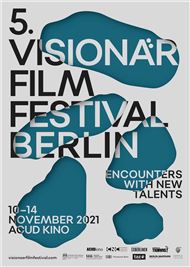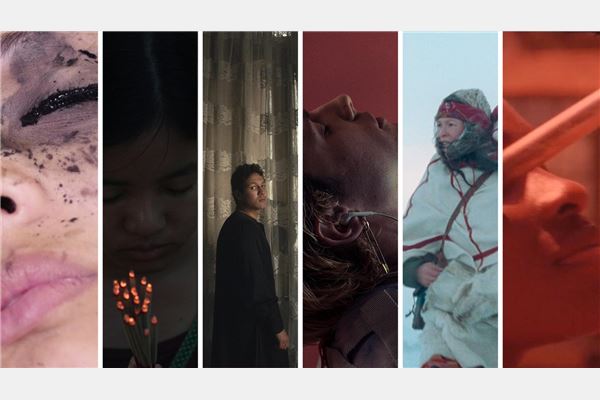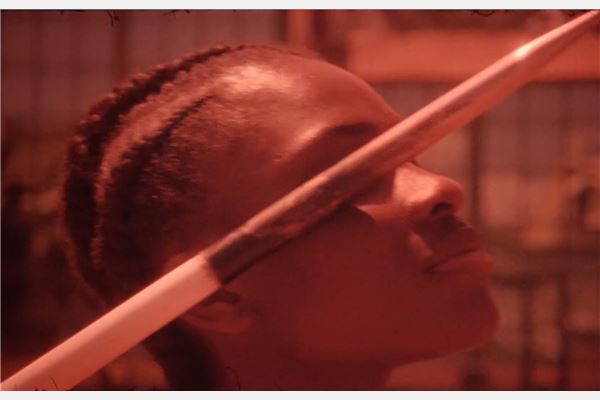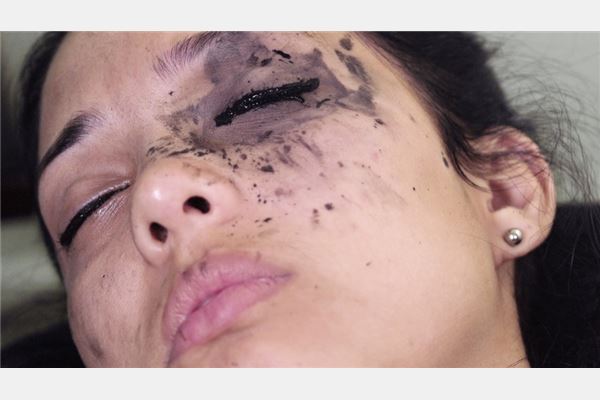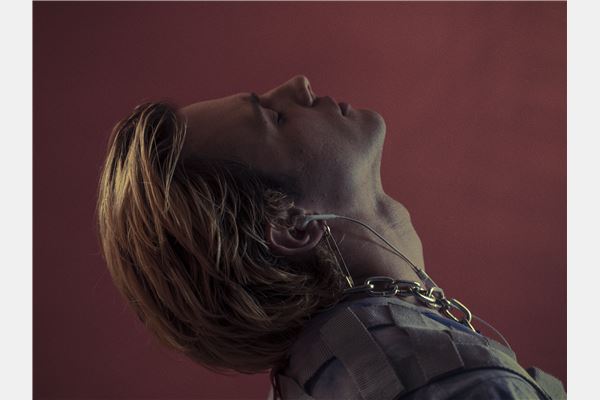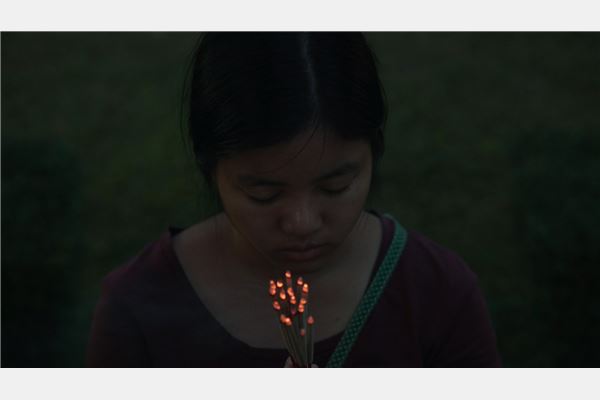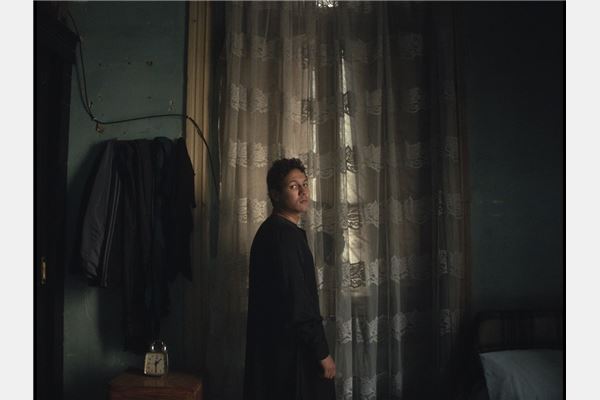Panorama: Rebels #2
5. Visionär Film Festival Berlin – Encounters With New Talents
[EN] I am afraid to forget your face by Sameh Alaa
Egypt, France, Qatar, Belgium, 15‘, 2020
After being separated for 82 days, Adam travels down a rough road to be reunited with the one he loves, whatever it takes.
Born in Cairo, Egypt, Sameh studied German literature at Cairo University. Before moving to Europe, he worked as an assistant director in advertisement and feature films. In 2016, he finished his MA in filmmaking at EICAR film school in Paris. Sameh’s first short film Fifteen premiered at Toronto International Film Festival 2017 and won several awards around the world. In 2019 he made his first advertisement campaign as a writer and director. His last short film I am afraid to forget your face, is the first Egyptian film in 50 years to be selected for the Official Short Film Competition at Cannes Film Festival 2020. Sameh is currently developing his debut feature film.
Fifteen – 2017 – short film
I am afraid to forget your face – 2020 – short film
[DE] I am afraid to forget your face von Sameh Alaa
Ägypten, Frankreich, Katar, Belgien, 15‘, 2020
Nachdem sie 82 Tage getrennt waren, macht sich Adam auf den beschwerlichen Weg, um wieder mit dem Menschen vereint zu sein, den er liebt – koste es was es wolle.
Sameh wurde in Kairo, Ägypten geboren und studierte deutsche Literatur an der Universität von Kairo. Bevor er nach Europa zog, arbeitete er als Regieassistent für Werbe- und Spielfilme. 2016 beendete er seinen Master in Film an der International Film & Television School Paris EICAR. Sameh’s erster Kurzfilm Fifteen hatte 2017 beim Toronto International Film Festival 2017 Premiere und gewann mehrere Preise weltweit. 2019 drehte er seine erste Werbekampagne als Autor und Regisseur. Sein letzter Kurzfilm, I am afraid to forget your face, ist 2020 der erste ägyptische Film, der seit 50 Jahren, in den offiziellen Kurzfilmwettbewerb bei den Filmfestspielen von Cannes eingeladen wurde. Sameh entwickelt derzeit sein Spielfilmdebüt.
Fifteen – 2017 – Kurzfilm
I am afraid to forget your face – 2020 – Kurzfilm
________________________
[EN] Lemongrass Girl by Pom Bunsermvicha
Thailand, 17‘, 2021
According to Thai superstition, a virgin can ward off rain by planting lemongrass upside-down underneath an open sky. This belief remains prevalent to this day.
As clouds begin to gather, a young production manager on a film set is tasked to carry out this tradition. As her fellow female co-workers shy away from the duty, she is left with no choice but to take on the burden of becoming the lemongrass girl.
“The hybrid structure of a docufiction lets Bunsermvicha reconstitute reality to create a powerful examination of sexism and power relations on film sets.”
Pom Bunsermvicha (b.1993, Thailand) graduated from Brown University with a Bachelor of Arts degree in Modern Culture & Media Studies. During her semester abroad in Prague, she attended the Film and TV School of the Academy of Performing Arts (FAMU) and directed her first short film 10:10. Her documentary E-po is her first work from Thailand. Her shorts have been shown at several festivals, including BFI Flare, LAAPFF, Inside Out Toronto, Hamburg International Short Film Festival and SeaShorts. Her work combines documentary elements with fiction and is driven by her interest in queer and female characters. Pom is an alumna of Tribeca Film Institute and Berlinale Talents.
10:10 – 2015
Graduation Speech – 2015
Coach – 2016
E-po (A Second Chance) – 2018
Lemongrass Girl – 2021
[DE] Lemongrass Girl von Pom Bunsermvicha
Thailand, 17‘, 2021
Einem thailändischen Volksglauben zufolge kann eine Jungfrau den Regen abwehren, indem sie unter offenem Himmel Zitronengras verkehrtherum einpflanzt. Dieser Glaube ist bis heute weit verbreitet. Als sich die Wolken zusammenziehen, wird eine junge Produktionsleiterin an einem Filmset beauftragt, diese Tradition auszuführen. Da ihre Kolleginnen vor dieser Aufgabe zurückschrecken, bleibt ihr nichts anderes übrig, als die Bürde auf sich zu nehmen, das ‚Lemongrass Girl‘ zu spielen.
„Die hybride Struktur einer Dokufiktion erlaubt es Bunsermvicha, die Realität zu rekonstituieren, um eine kraftvolle Untersuchung von Sexismus und Machtverhältnissen an Filmsets zu schaffen.“
Pom Bunsermvicha (*1993, Thailand) machte ihren Bachelor in Modern Culture & Media Studies an der Brown University. Während ihres Auslandssemesters in Prag besuchte sie Kurse an der Film- und Fernsehschule der Academy of Performing Arts (FAMU) und führte bei ihrem ersten Kurzfilm 10:10 Regie. Ihr Dokumentarfilm E-po ist ihre erste Arbeit aus Thailand. Ihre Kurzfilme wurden auf mehreren Festivals gezeigt, darunter BFI Flare, LAAPFF, Inside Out Toronto, Internationales Kurzfilmfestival Hamburg und SeaShorts. Ihre Arbeit verbindet dokumentarische Elemente mit Fiktion und wird von ihrem Interesse an queeren und weiblichen Charakteren angetrieben. Pom ist Alumna des Tribeca Film Institute und von Berlinale Talents.
10:10 – 2015
Graduation Speech – 2015
Coach – 2016
E-po (A Second Chance) – 2018
Lemongrass Girl – 2021
________________________
[EN] The End of Suffering (a proposal) by Jacqueline Lentzou
Greece, 14‘, 2020
Sofia is panicky, again. The Universe decides to contact her. An other-wordly dialogue. A planet symphony for Mars, where people dream awake and fight for love.
“contemplates an imaginary solution to the problems of life on Earth with affecting humor.”
Jacqueline (Athens, 1989) is a writer/director whose cinematic language involves finding poetry in –seemingly- mundane premises and/or creating visual poetry through word and image association. She experiments with formats, duration and feelings.
Thematically her films revolve around unconventional family constructs, love (and the lack of it), loneliness and belonging.
She has directed four shorts which have screened and won in numerous festivals, the most prestigious one being the Cine Leica Discovery Award in Cannes’ Semaine De La Critique (2018) for Hector Malot: The Last Day of the Year.
MOON:66 QUESTIONS - 2021 (Berlinale Encounters)
The End of Suffering (a Proposal) – 2020
Hector Malot: The Last Day of the Year – 2018
Hiwa – 2017
Fox / Alepou- 2016
Thirteen Blue – 2013
[DE] The End of Suffering (a proposal) von Jacqueline Lentzou
Griechenland, 14‘, 2020
Sofia ist mal wieder panisch. Das Universum beschließt, sie zu kontaktieren. Ein Dialog aus einer anderen Welt. Eine Planetensinfonie für den Mars, wo die Menschen wach träumen und um die Liebe kämpfen.
„Mit berührendem Humor wird über eine imaginäre Lösung für die Probleme des Lebens auf der Erde nachgedacht.“
Jacqueline (*Athen, 1989) ist Autorin und Regisseurin. Zu ihrer Filmsprache gehören Assoziationen, Träume und Intuitionen. Sie sucht nach dem Poetischen im vermeintlich Alltäglichen und experimentiert mit Formaten, Zeitspannen und Gefühlen. Lentzous Werk umkreist die Themen moderne Familienstrukturen, Einsamkeit, Dualität und Einheit, Liebe und der Mangel an Liebe. Sie hat bei vier Kurzfilmen Regie geführt, die auf zahlreichen Festivals gezeigt und ausgezeichnet wurden, so u.a. mit dem prestigeträchtigen Cine Leica Discovery Award der Semaine De La Critique in Cannes 2018 für Hector Malot: The Last Day of the Year.
MOON:66 QUESTIONS - 2021 (Berlinale Encounters)
The End of Suffering (a Proposal) – 2020
Hector Malot: The Last Day of the Year – 2018
Hiwa – 2017
Fox / Alepou- 2016
Thirteen Blue – 2013
__________________
[ESP] La Bonita by María del Mar Rosario
Uñas acrílicas, depilación con cera caliente, maquillaje permanente con agujas frías: esta construcción sirve de barniz que cubre las capas escondidas de un dolor femenino no identificado.
Bio:
María del Mar Rosario es una cineasta de Puerto Rico. Graduada de la Universidad de Columbia en Nueva York, y completó su título de posgrado en dirección de documental de la Escuela Internacional de Cine y Televisión de San Antonio de Los Baños, Cuba (EICTV). María del Mar ha sido galardonada con la Beca IFP-Marcie Bloom en Cine 2018-2019; fue becada por Creative Capital con una beca para artistas emergentes latinx en Nueva York. Sus películas se han estrenado en festivales cómo IDFA, Hot Docs y Palms Springs, entre otros. Tiene una maestría en Artes mediáticas de la Universidad de la Ciudad de Nueva York y acaba de finalizar una mentoria bajo el Programa de Estudios Independientes (PEI) del Museo de Arte Contemporáneo de Puerto Rico donde estuvo desarrollando su próximo proyecto. Vive en Harlem, Nueva York y anhela expandir los temas de su obra a su Puerto Rico natal.
[ENG] La Bonita by María del Mar Rosario, Cuba, Puerto Rico, 2018, 18’
Acrylic nails, hot waxing, permanent makeup with cold needles: this construction serves as a varnish that covers the hidden layers of an unidentified female pain.
Bio:
María del Mar Rosario is a filmmaker from Puerto Rico. She graduated from Columbia University in New York, and completed her graduate degree in documentary directing from the International Film and Television School of San Antonio de Los Baños, Cuba (EICTV). María del Mar is a recipient of the 2018-2019 IFP-Marcie Bloom Fellowship in Film; she was awarded a Creative Capital Latinax Emerging Artist Fellowship in New York. Her films have premiered at festivals such as IDFA, Hot Docs and Palms Springs, among others. She holds a Masters in Media Arts from the City University of New York and has just completed a mentorship under the Independent Study Program (PEI) at the Museo de Arte Contemporáneo de Puerto Rico where she was developing her next project. She lives in Harlem, New York and yearns to expand the themes of her work to her native Puerto Rico.
[DE] La Bonita von María del Mar Rosario, Kuba, Puerto Rico, 2018, 18’
Nägel aus Acryl, Haarentfernung mit Heißwachs, Permanent Make-Up mit kalter Nadel: Diese Konstruktion dient als Lack, der die verborgenen Schichten des unerkannten weiblichen Schmerzes überdeckt.
Bio:
María del Mar Rosario ist eine Filmemacherin aus Puerto Rico. Sie machte ihren Abschluss an der Columbia University in New York und absolvierte ein Aufbaustudium in Dokumentarfilmregie an der Escuela Internacional de Cine y Televisión de San Antonio de Los Baños in Kuba. María del Mar war 2018 Stipendiatin der IFP-Marcie Bloom Fellowship in Film und wurde auch mit dem Creative Capital Emerging Latinx Artist Stipendium in New York ausgezeichnet. Ihre Filme prämierten unter anderem auf Festivals wie IDFA, Hot Docs und Palms Springs. Sie hat einen Master in Medienkunst von der City University of New York und gerade eine Mentorenschaft im Rahmen des Independent Study Program (PEI) am Museum für Zeitgenössische Kunst in Puerto Rico abgeschlossen, wo sie ihr nächstes Projekt entwickelte. Sie lebt in Harlem, New York, und sehnt sich danach, die Themen ihrer Arbeit auf ihre Heimat Puerto Rico auszuweiten.
_______________________
[EN] The Tongues (Njuokcamat) by Marja Bål Nango and Ingir Bål, Norway, 2019, 15‘
During a blizzard on the tundra, a Sami woman is herding her reindeer when she is brutally raped by a man. Her sister senses that something is wrong and starts looking for her. Wrapped in fear and confusion, both women will unite in their fight for revenge.
BIO
The Tongues is directed and written by the sisters Marja Bål Nango and Ingir Bål. Both are Sami indigenous, living on the tundra in arctic Norway and working as reindeer herders, which is their heritage.
Marja Bål Nango (b. 1988) is a Sami director from Galgujávri, Norway. Her education stems from Nordland Art and Film School, Film & Television studies at Lillehammer University College and Film producing at Sámi University College.
Her graduate short film Før hun kom, etter han dro (2012) won the Ellen Monague Award at the imagineNATIVE in Toronto, and her last short film O.M.G - Oh máigon girl (2015) won the UR Award at Uppsala Film Festival and Skårungen Award at Tromsø International Film Festival.
Marja has participated in many international film festivals and is a member of the Sami International Film Institute. She is also a member of the board of the Northern Norway Film Center, a film funding center in Northern Norway.
[DE] The Tongues (Njuokcamat) von Marja Bål Nango und Ingir Bål, Norwegen, 2019, 15'
Während eines Schneesturms in der Tundra hütet eine samische Frau ihre Rentiere, als sie von einem Mann brutal vergewaltigt wird. Ihre Schwester spürt, dass etwas nicht stimmt, und macht sich auf die Suche nach ihr. Überwältigt von Angst und Verwirrung schließen sich die beiden Frauen in ihrem Kampf um Rache zusammen.
Bio
Regie und Drehbuch von The Tongues stammen von den Schwestern Marja Bål Nango und Ingir Bål, die beide der Volksgruppe der Samen angehören. Sie leben in der Tundra im arktischen Norwegen, wo sie, entsprechend ihrer Tradition, Rentierzucht betreiben.
Marja Bål Mango (geb. 1988) ist eine samische Regisseurin aus Galgujávri, Norwegen. Ihre Ausbildung hat sie an der Nordland Art and Film School absolviert, darüber hinaus studierte sie Film und Fernsehen an der Hochschule Lillehammer sowie Filmproduktion am Sámi University College.
Ihr Abschlusskurzfilm Før hun kom, etter han dro (2012) gewann den Ellen Monague Award beim imagineNATIVE in Toronto und ihr letzter Kurzfilm O.M.G - Oh máigon girl (2015) gewann sowohl den UR Award beim Uppsala Film Festival als auch den Skårungen Award beim Tromsø International Film Festival.
Marja hat an vielen internationalen Filmfestivals teilgenommen und ist Mitglied des Sami International Film Institute. Außerdem ist sie Mitglied des Vorstands des Northern Norway Film Center, einem Filmförderungszentrum in Nordnorwegen.
Sie arbeitete als Rentierkoordinatorin und Regieassistentin bei Sami Blood (Regie: Amanda Kernell, 2016). 2018 wurde sie für das FilmLab Norway-Programm ausgewählt - das Talentförderungsprogramm von NFI und Talent Norges für Regisseurinnen.
__________________
[EN] Young Diego (El Joven Diego) by Osama Chami and Enrique Gimeno Pedrós, Spain, 2021, 7’
Filmed on 16mm film, in just one location and with only one actor, Young Diego appears as a metaphor that explores interpersonal relations and human desire. A personal portrait about youth and the seeking of first love, with an unsettling atmosphere and a narrative open to different interpretations.
Bio
Osama Chami and Enrique Gimeno Pedrós directed their first short film, According to Mateo in 2017. It premiered at Outfest in Los Angeles (California, USA) and made its way into the official selection of different international festivals such as Fringe! Queer Film Festival in London, Cine Movilh in Chile, InDPanda in Hong Kong, Our City Film Project in South Africa and LesGaiCineMad in Madrid, where it was awarded the Special Jury Prize. According to Mateo is now available on Filmin.
[DE] Young Diego (El Joven Diego) von Osama Chami and Enrique Gimeno Pedrós, Spanien, 2021, 7’
Gedreht auf 16-mm, an nur einem Ort und mit nur einem Schauspieler, erscheint Young Diego als eine Metapher, die zwischenmenschliche Beziehungen und menschliches Verlangen erforscht. Ein persönliches Porträt über die Jugend und die Suche nach der ersten Liebe, geprägt von einer beklemmenden Atmosphäre und einer Erzählung, die für verschiedene Interpretationen offen ist.
BIO
Osama Chami und Enrique Gimeno Pedrós drehten 2017 ihren ersten Kurzfilm, According to Mateo. Er wurde auf dem Outfest in Los Angeles (Kalifornien, USA) uraufgeführt und schaffte es in die offizielle Auswahl verschiedener internationaler Festivals wie dem Fringe! Queer Film Festival in London, Cine Movilh in Chile, InDPanda in Hongkong, Our City Film Project in Südafrika und LesGaiCineMad in Madrid, wo er mit dem Sonderpreis der Jury ausgezeichnet wurde. According to Mateo ist nun bei Filmin verfügbar.
